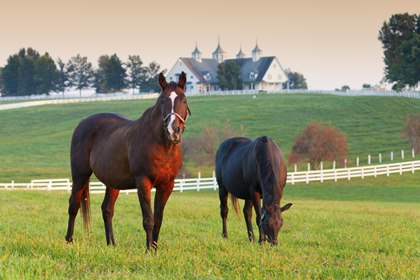 Colic is perhaps one of the most distressing and potentially life threatening conditions that a horse can experience, so it is little wonder that it is also one of the conditions that is most feared by horse owners. Colic can strike at any time, without warning, however it is often linked to food or water sources and there are different types categorised by the actual cause of the colic itself.
Colic is perhaps one of the most distressing and potentially life threatening conditions that a horse can experience, so it is little wonder that it is also one of the conditions that is most feared by horse owners. Colic can strike at any time, without warning, however it is often linked to food or water sources and there are different types categorised by the actual cause of the colic itself.
Horses that ingest large quantities of grain can sometimes experience stomach distention which can result in rupture. Colic can also occur when excessive amounts of gas build up within the stomach or the intestine and spasmodic colic is one of the most common variant, where the intestine contract painfully. The most dangerous types of colic are impaction colic, where the intestines are blocked by large feed bolus or foreign material, and displacement colic where the small intestine twist, usually after becoming suspended in the abdominal cavity due to gas build up. Both of these types of colic are fatal without immediate surgery, so diagnosis and treatment is imperative to ensure the safety and well-being of your horse.
What are the signs to look out for?
Horses experiencing colic often exhibit unusual behaviour that indicates severe abdominal pain including the following:

What can I do to help my horse?
As the colic progresses, the symptoms and behaviours will gradually become more and more excessive and in some cases quite violent. If any of the above are exhibited you must call a veterinarian immediately, and it is important that you try to keep the horse calm and keep him moving by walking gently. This can help to ease discomfort and improve intestinal activity which may relieve pressure from trapped gas whilst taking the horses mind off the pain. Also, by stopping him from rolling you will decrease the likelihood of the gut becoming twisted and strangulated.
Remove all food and water sources as these are often linked to the colic and can worsen the horse’s condition. If the horse is unable to stand make sure that he is in a small, secure area where he can safely lie down and roll without getting cast until the vet arrives. Treatment may involve anti-spasmodic drugs that help the intestine to relax and return to normal function, or in worse case scenarios, your horse may require immediate transfer to an equine hospital for surgery to repair a strangulated or ruptured gut. The quicker your horse is diagnosed and treated, the better chance he will have of making a full recovery.
